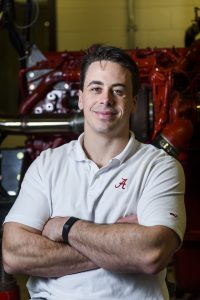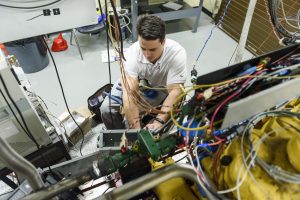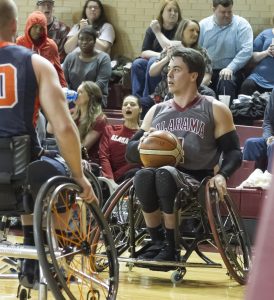By David Miller

The University of Alabama Adapted Athletics program got James Cook to campus, and UA’s College of Engineering closed the deal.
Cook, a doctoral student in automotive engineering and wheelchair basketball player, earned an undergraduate degree at Virginia Tech. He’d narrowed his graduate school options to Virginia Tech, Clemson University and UA.
Blacksburg, Virginia, was like home to Cook; he’d gone to football games at Virginia Tech since he was a kid. Clemson’s draw was the International Center for Automotive Research.
But a visit to UA revealed more than, “the things you read in Forbes or U.S. News,” like the “really cool stuff” in UA’s automotive engineering lab, Cook said.
“I get here and they have a Mercedes set up on two rollers, where you can take power, speed and different emissions data from the vehicle,” Cook said. “They had two large diesel engines set up on chassis dynamometers, collecting data. Most of the schools in the country don’t have specific automotive engineering equipment like emissions benches and different dynamometers.”
Cook spends most afternoons in the lab, writing and troubleshooting control code to better optimize engine performance and emissions. He hopes to complete his research and defend his dissertation by Spring Semester 2019, when he’ll be awarded both his master’s and doctoral degrees.
His fascination with speed and vehicles will continue to grow, hopefully into racing engineering, he said.
“I’m currently working more on emissions and fuel economy, because that’s where our economy is right now,” Cook said. “But I’d like to get back to what I know about automotive and engine controls to get into performance. Teaching is an option – that may give me more freedom over my schedule. I do like research and the ability to dictate what you’re working on.”
An Early Need for Speed
Cook has played for UA’s men’s wheelchair basketball team for the last three seasons and is currently averaging 3.6 points and two rebounds a game.
UA will enter the National Wheelchair Basketball Association Intercollegiate national tournament as one of two favorites to win a championship, which could be the program’s first title since 2013.
Cook was an all-American lacrosse player in high school. He also played football and soccer and has skied since he was 2 years old.
“At that time, sports were my life,” Cook said. “By far my favorite thing to do.”

Cook didn’t play sports while at Virginia Tech. Instead, he joined the Corps of Cadets and began working toward an even faster activity – flying jets in the Navy. Those dreams would be grounded in October 2010 when a Corps of Cadets initiation resulted in Cook injuring his spinal cord at the T-10 and T-12 vertebrae. He had a collapsed lung, cracked ribs, damaged internal organs and needed multiple surgeries. He rehabbed at Shepherd Center in Atlanta and relearned many of his daily routines from a wheelchair before returning to Virginia Tech in fall 2011.
“It was tough at first … being in wheelchair, you’re always self-conscious, even today,” Cook said. “It’s an odd feeling. People definitely notice you.”
Cook said he missed the bonds with his classmates in the Corps, but he wasn’t bitter over the accident. He would, however, have to find an outlet for speed and competition. He started in wheelchair lacrosse in 2011 and wheelchair basketball in 2012, driving two hours each Sunday to practice with a team in Charlottesville.
“They lent me a chair – it didn’t fit too well, but I got to play,” Cook said. “It was fun to get to play sports again on a regular basis.”
In 2013, Cook began competing in cycling marathons and specialty events across the country. He’s raced in Los Angeles, Baltimore and Pittsburgh and still competes during wheelchair basketball’s offseason.
“I was hooked after my first race,” Cook said. “I did one last fall in Pensacola, where we had a time trial, a road race, then a circuit. It’s difficult because you’re in close quarters, and I placed second, third and first in those events.”
The UA Experience
Over the next year, Cook must write three technical papers on topics like optimizing throttle control and turbo-charger performance on a diesel engine.

Before he can begin working on his dissertation, he’ll continue to spend countless hours in the lab, writing algorithms and control code that rarely work on the first try.
It’s a time-consuming process that requires the same levels of patience and focus Cook needed when he learned to use a wheelchair and become a collegiate athlete.
“It’s one step forward and two steps back in my research, which can be frustrating at times,” Cook said. “But the problem-solving in writing code has always fascinated me, even if it’s optimizing or fixing something small, it’s satisfying.”
Cook is just the second UA men’s wheelchair basketball player to compete while working on a doctoral degree, according to Ford Burttram, UA men’s head coach.
Burttram said he isn’t surprised that Cook, a second-year captain, can handle research, early-morning practices and competition schedules.
“He showed up to UA very green at the sport, but he’s come a long way and is an on-court general for us,” Burttram said. “His mental fortitude teaches our younger guys how to work toward their goals.
“The adaptive part of it, the basketball, the things he can do around here – it’s a great bonus for him, but what really sold him was our engineering, the quiet, underlying voice in how good we are academically at UA.”
